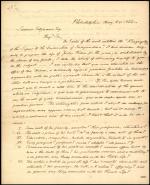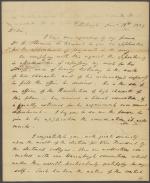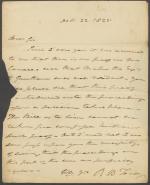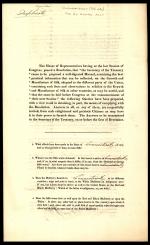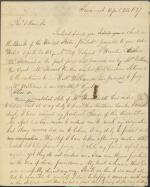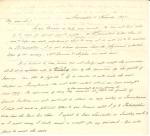About Full-Text Documents
Collections of college and personal papers, as well as a select number of individual documents, have been briefly described in entries available for browsing and searching on this site. All collection and document descriptions contain a representative image and a summary of the contents.
Search Document Descriptions
Browse Document Descriptions
June 1823
This copy of the printed program for the commencement exercises held in June 1823 shows the members of the graduating class and the speeches that they were scheduled to deliver.
Format: Memorabilia and Ephemera
Location: Dickinsoniana Programs
Subject: Dickinson College Events
Time Period: 1820-1839
View Item: 1823 Commencement Program
February 13, 1824
Former Pennsylvania Representative Andrew Boden asks John Boyle, an attorney at the US Navy Office in Washington, to “procure for me” a copy of “the secret minutes of the convention, which framed the U. S. constitution.” As a member of Congress in 1818 when that body approved a resolution to publish those minutes, Boden explains that he is “entitled to” a copy. In addition, Boden comments on the upcoming 1824 Presidential election. “The Presidential question is considerably agitated here” in Carlisle and, as Boden notes, “[Andrew] Jackson is the most prominent candidate.” Transcript included.
Format: Letters/Correspondence
Location: I-SpahrB-undated-4
Subject: Carlisle and Cumberland County, Politics and Government
Time Period: 1820-1839
View Item: Letter from Andrew Boden to John Boyle
February 17, 1824
Anna Laetitia Barbauld asks Ritchard Taylor to post a letter for her and to come visit.
Format: Letters/Correspondence
Location: I-Friends-1974-10
Subject: Personal and Family Life
Time Period: 1820-1839
View Item: Letter from Anna Barbauld to Ritchard Taylor
March 5, 1824
Attorney Roger Brooke Taney informs his client, Mrs. Patterson, that she has been served with a legal notice. When Mrs. Patterson returns from a few days in the country, Taney explains that "I will arrange with you the course proper to be taken." Transcript included.
Format: Letters/Correspondence
Location: I-SpahrB-1964-6
Subject: Legal Affairs
Time Period: 1820-1839
View Item: Letter from Roger B. Taney to Mrs. Patterson
May 24, 1824
Author Robert Waln, Jr. writes Pennsylvania politician Samuel Sitgreaves to ask for information about the life of James Wilson for a book entitled Biography of the Signers of the Declaration of Independence. Waln poses nine questions to Sitgreaves regarding Wilson's personal and professional lives.
Format: Letters/Correspondence
Location: I-Friends-1992-6
Subject: Genealogy and Family History, Literary Pursuits, Personal and Family Life, Politics and Government
Time Period: 1820-1839
View Item: Letter from Robert Waln, Jr. to Samuel Sitgreaves
August 25, 1824
Attorney Roger Brooke Taney writes to his client, a Mr. Colt, and offers advice on the best way to influence the federal government. "Your interest would best be promoted by addressing a memorial to the Secretary of the Treasury" because, as Taney explains, "in that form I could more convincingly embody the arguments I wished to offer." Taney also informs Mr. Colt that of an additional $50 fee. William H. Crawford is Treasury Secretary in 1824.
Format: Letters/Correspondence
Location: I-SpahrB-1965-15
Subject: Economics and Finance, Legal Affairs, Politics and Government
Time Period: 1820-1839
View Item: Letter from Roger B. Taney to Mr. Colt
December 12, 1824
William Wilkins writes to Secretary of War John C. Calhoun and recommends the son of an officer who served during the American Revolution, Dr. H. Stevenson, as an army paymaster. Wilkins also congratulates Calhoun on his election to Vice President of the United States in the Election of 1824.
Format: Letters/Correspondence
Location: I-Purchase-1955-60
Subject: Military Affairs and Conflict, Politics and Government
Time Period: 1820-1839
View Item: Letter from William Wilkins to John Calhoun
February 10, 1825
Attorney Roger Brooke Taney asks for information about legal decisions in Maryland regarding selling property "conveyed in trust to secure the repayment of money loaned." Taney also request a copy of the relevant decision by the court of appeals or, if that court has not decided the case, by the chancery court. Taney, who notes that he "will pay the fees of the copy, explains that "Judge Kelly of the United States Senate has inquired" about this particular issue. Transcript included.
Format: Letters/Correspondence
Location: I-SpahrB-1963-4
Subject: Economics and Finance, Legal Affairs
Time Period: 1820-1839
June 10, 1825
Lancelot Johnston of Morgan County, Georgia, son of a friend and physician of George Washington, buys "a negro man named Tilman" from M. L. Graves for five hundred and fifty dollars on June 10, 1825.
Format: Financial Documents
Location: I-NelsonR-1956-1
Subject: Business and Industry
Time Period: 1820-1839
View Item: Bill of Sale from M.L. Graves to Lancelot Johnston
July 30, 1825
Samuel Maclay receives his Bachelor of Arts Diploma from Dickinson College on July 30, 1825.
Format: Certificates and Diplomas
Location: Diploma Collection
Subject: Education
Time Period: 1820-1839
View Item: Bachelor of Arts Diploma - Samuel Maclay
July 31, 1825
Samuel Maclay, a member of the Class of 1825, receives this diploma as a member of the Union Philosophical Society on July 31, 1825.
Format: Certificates and Diplomas
Location: Diploma Collection
Subject: Education
Time Period: 1820-1839
View Item: Union Philosophical Society Diploma - Samuel Maclay
July 31, 1825
Alexander Macbeth, a member of the Class of 1825, receives this diploma as a member of the Union Philosophical Society on July 31, 1825.
Format: Certificates and Diplomas
Location: Diploma Collection
Subject: Education
Time Period: 1820-1839
View Item: Union Philosophical Society Diploma - Alexander Macbeth
October 11, 1825
Baltimore attorney Roger Brooke Taney writes J. J. Speed, an attorney in Annapolis, and discusses a particular legal case. "The postponement of the case of Canals vs. McFadon is perfectly agreeable to me," as Taney explains.
Format: Letters/Correspondence
Location: I-SpahrB-1965-6
Subject: Legal Affairs
Time Period: 1820-1839
View Item: Letter from Roger B. Taney to J. J. Speed
October 22, 1825
Attorney Roger Brooke Taney to another lawyer, J. J. Speed, about proving a certain point in a particular legal case. "Please see that this proof [is] introduced into the proceedings before a decision takes place," as Taney explains.
Format: Letters/Correspondence
Location: I-SpahrB-1969-5
Subject: Legal Affairs
Time Period: 1820-1839
View Item: Letter from Roger B. Taney to J. J. Speed
February 7, [1826]
Attorney Roger Brooke Taney writes to Senator Samuel Smith and discuses his thoughts upon treaty making authority and obligations of the President and Congress, referencing France and an act of 1793 as well as Georgia in treaty with Native American tribes. While Taney writes the year incorrectly, Smith endorses the correct year as 1826.
Format: Letters/Correspondence
Location: I-SpahrB-1954-4
Subject: International Affairs, Legal Affairs, Native Americans, Politics and Government
Time Period: 1820-1839
View Item: Letter from Roger B. Taney to Samuel Smith
March 22, 1826
Attorney Roger Brooke Taney writes to William Beall, a member of Andrew Jackson's Democratic Central Committee, regarding legal issues of a mutual acquaintance. "You have I presume heard of the unfortunate affair in which Romeo's son William was supposed to be engaged" and, as Taney notes, "I hope I shall get him out of this trouble but in the mean time he is charged as an accessory." Transcript included.
Format: Letters/Correspondence
Location: I-AsbellY-2004-8
Subject: Legal Affairs, Personal and Family Life, Politics and Government
Time Period: 1820-1839
View Item: Letter from Roger B. Taney to William Beall
June 24, 1826
Mary Nisbet Turnbull writes to her son, Alexander Turnbull, discussing new developments in the affairs of his father's estate, in addition to the lives of other members of their family. Transcript included.
Format: Letters/Correspondence
Location: MC 2001.7, B1, F25
Subject: Land and Real Estate, Personal and Family Life
Time Period: 1820-1839
July 29, 1826
Secretary of the Treasury Richard Rush prepares a questionnaire on the manufacture of silk for Connecticut to be included in a manual mandated by the House of Representatives.
Format: Reports
Location: I-BeachW-1983-4
Subject: Business and Industry, Politics and Government
Time Period: 1820-1839
View Item: Questionnaire Prepared by Richard Rush
September 27, 1826
This copy of the printed program for the commencement exercises held on September 27, 1826 shows the members of the graduating class and the speeches that they were scheduled to deliver.
Format: Memorabilia and Ephemera
Location: Dickinsoniana Programs
Subject: Dickinson College Events
Time Period: 1820-1839
View Item: 1826 Commencement Program
November 14, 1826
Attorney Roger Brooke Taney writes General Walter Jones to discussing the timing of "the monastery case." Taney notes that Jones should "consider the case as continued until June next."
Format: Letters/Correspondence
Location: I-SpahrB-1953-20
Subject: Legal Affairs
Time Period: 1820-1839
View Item: Letter from Roger B. Taney to Walter Jones
1827-1842
James Buchanan writes six letters to John Reynolds on a variety of different legal and political matters, including the Presidential elections of 1828 and 1844, Buchanan's experience living in Russia as the US minister, and increasing sectional tensions. Transcripts included.
Format: Letters/Correspondence
Location: MC 1998.10
Subject: Business and Industry, Health and Medicine, International Affairs, Personal and Family Life, Politics and Government, Travel and Tourism
Time Period: 1820-1839, 1840-1859
View Item: Letters from James Buchanan to John Reynolds
April 23, 1827
Rev. Samuel B. How writes to Reverend Ashbel Green to settle his accounts and explain that he must leave the pastorate because his wife is sick. "[The] wretched state of Mrs. How’s health has induced [me] to believe that it is my duty to leave this Southern Country and accordingly I have resigned my pastoral charge of this congregation," as How notes. In addition, How includes an "Account of money recd. for the Christian Advocate" as well as a check to cover a subscription to that publication for a Mr. Thomas Butler. Transcript included.
Format: Letters/Correspondence
Location: I-BeachW-1980-1
Subject: Economics and Finance, Personal and Family Life, Religion and Spirituality
Time Period: 1820-1839
View Item: Letter from Samuel How to Ashbel Green
May 15, 1827
Secretary of the Treasury Richard Rush acknowledges the receipt of two letters and states that he "took pleasure in receiving" E. H. Mills' correspondence.
Format: Letters/Correspondence
Location: I-BeachW-1984-7
Subject: Personal and Family Life
Time Period: 1820-1839
View Item: Letter from Richard Rush to E. H. Mills
1827-1841
James Buchanan writes to Samuel D. Ingham, Esquire, discussing a conflict between him and General Jackson which Buchanan is to address in the Lancaster Journal. He expresses concern over "the preservation of [his] own character." He claims in a subsequent letter that the "Jackson papers generally have managed the subject very discretely." In the last letter, Buchanan discusses the presidency of John Tyler, the Bank bill, and Daniel Webster. Transcripts included.
Format: Letters/Correspondence
Location: MC 1998.10
Subject: Economics and Finance, Politics and Government
Time Period: 1820-1839
View Item: Letters from James Buchanan to Samuel Ingham
1827-1828
Representative James Buchanan writes Thomas Elder and discusses a number of issues in two letters, including the health of Judge Duncan, the 1829 Pennsylvania gubernatorial election, cities that a transcontinental road would pass through, a trial of six Tennessee militia men sentenced to execution, and the rise of the tariff. Transcripts included.
Format: Letters/Correspondence
Location: MC 1998.10
Subject: Business and Industry, Economics and Finance, Health and Medicine, Legal Affairs, Politics and Government
Time Period: 1820-1839
View Item: Letters from James Buchanan to Thomas Elder





